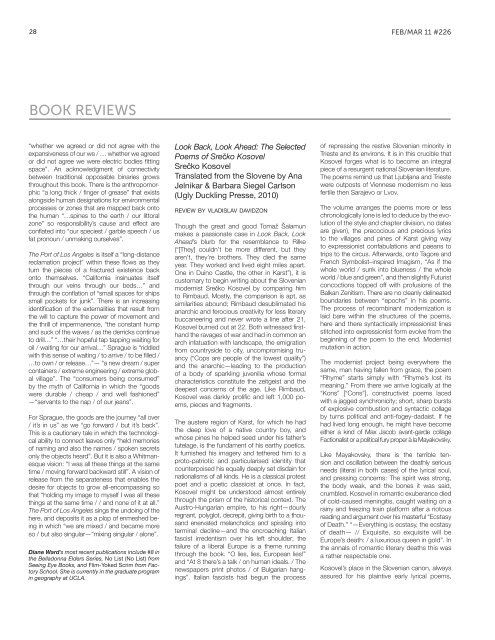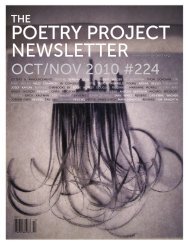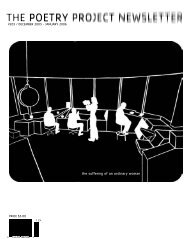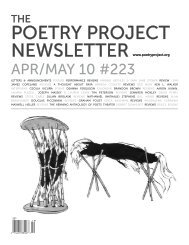Create successful ePaper yourself
Turn your PDF publications into a flip-book with our unique Google optimized e-Paper software.
28 FEB/MAR 11 #226BOOK REVIEWS“whether we agreed or did not agree with theexpansiveness of our we / … whether we agreedor did not agree we were electric bodies fittingspace”. An acknowledgment of connectivitybetween traditional opposable binaries growsthroughout this book. <strong>The</strong>re is the anthropomorphic“a long thick / finger of grease” that existsalongside human designations for environmentalprocesses or zones that are mapped back ontothe human “…spines to the earth / our littoralzone” so responsibility’s cause and effect areconflated into “our speciest / garble speech / usfat pronoun / unmaking ourselves”.<strong>The</strong> Port of Los Angeles is itself a “long-distancereclamation project” within these flows as theyturn the pieces of a fractured existence backonto themselves. “California insinuates itselfthrough our veins through our beds…” andthrough the conflation of “small spaces for shipssmall pockets for junk”. <strong>The</strong>re is an increasingidentification of the externalities that result fromthe will to capture the power of movement andthe thrill of impermanence, “the constant humpand suck of the waves / as the derricks continueto drill…” “…their hopeful tap tapping waiting foroil / waiting for our arrival…” Sprague is “riddledwith this sense of waiting / to arrive / to be filled /…to own / or release…”— “a new dream / supercontainers / extreme engineering / extreme globalvillage”. <strong>The</strong> “consumers being consumed”by the myth of California in which the “goodswere durable / cheap / and well fashioned”—“servants to the nap / of our jeans”.For Sprague, the goods are the journey “all over/ it’s in us” as we “go forward / but it’s back”.This is a cautionary tale in which the technologicalability to connect leaves only “held memoriesof naming and also the names / spoken secretsonly the objects heard”. But it is also a Whitmanesquevision: “I was all these things at the sametime / moving forward backward still”. A vision ofrelease from the separateness that enables thedesire for objects to grow all-encompassing sothat “holding my image to myself I was all thesethings at the same time / / and none of it at all.”<strong>The</strong> Port of Los Angeles sings the undoing of thehere, and deposits it as a plop of enmeshed beingin which “we are mixed / and became moreso / but also singular—“mixing singular / alone”.Diane Ward’s most recent publications include #8 inthe Belladonna Elders Series, No List (No List) fromSeeing Eye Books, and Flim-Yoked Scrim from FactorySchool. She is currently in the graduate programin geography at UCLA.Look Back, Look Ahead: <strong>The</strong> SelectedPoems of Srečko KosovelSrečko KosovelTranslated from the Slovene by AnaJelnikar & Barbara Siegel Carlson(Ugly Duckling Presse, 2010)review by vladislav davidzonThough the great and good Tomaž Šalamunmakes a passionate case in Look Back, LookAhead’s blurb for the resemblance to Rilke(“[<strong>The</strong>y] couldn’t be more different, but theyaren’t, they’re brothers. <strong>The</strong>y died the sameyear. <strong>The</strong>y worked and lived eight miles apart.One in Duino Castle, the other in Karst”), it iscustomary to begin writing about the Slovenianmodernist Srečko Kosovel by comparing himto Rimbaud. Mostly, the comparison is apt, assimilarities abound; Rimbaud desublimated hisanarchic and ferocious creativity for less literarybuccaneering and never wrote a line after 21,Kosovel burned out at 22. Both witnessed firsthandthe ravages of war and had in common anarch infatuation with landscape, the emigrationfrom countryside to city, uncompromising truancy(“Cops are people of the lowest quality”)and the anarchic—leading to the productionof a body of sparkling juvenilia whose formalcharacteristics constitute the zeitgeist and thedeepest concerns of the age. Like Rimbaud,Kosovel was darkly prolific and left 1,000 poems,pieces and fragments.<strong>The</strong> austere region of Karst, for which he hadthe deep love of a native country boy, andwhose pines he helped seed under his father’stutelage, is the fundament of his earthy poetics.It furnished his imagery and tethered him to aproto-patriotic and particularised identity thatcounterpoised his equally deeply set disdain fornationalisms of all kinds. He is a classical protestpoet and a poetic classicist at once. In fact,Kosovel might be understood almost entirelythrough the prism of the historical context. <strong>The</strong>Austro-Hungarian empire, to his right—dourlyregnant, polyglot, decrepit, giving birth to a thousandenervated melancholics and spiraling intoterminal decline—and the encroaching Italianfascist irredentism over his left shoulder; thefailure of a liberal Europe is a theme runningthrough the book. “O lies, lies, European lies!”and “At 8 there’s a talk / on human ideals. / <strong>The</strong>newspapers print photos / of Bulgarian hangings”.Italian fascists had begun the processof repressing the restive Slovenian minority inTrieste and its environs. It is in this crucible thatKosovel forges what is to become an integralpiece of a resurgent national Slovenian literature.<strong>The</strong> poems remind us that Ljubljana and Triestewere outposts of Viennese modernism no lessfertile then Sarajevo or Lvov.<strong>The</strong> volume arranges the poems more or lesschronologically (one is led to deduce by the evolutionof the style and chapter division, no datesare given), the precocious and precious lyricsto the villages and pines of Karst giving wayto expressionist confabulations and paeans totrips to the circus. Afterwards, onto Tagore andFrench Symbolist–inspired Imagism, “As if thewhole world / sunk into blueness / the wholeworld / blue and green”, and then slightly Futuristconcoctions topped off with profusions of theBalkan Zenitism. <strong>The</strong>re are no cleanly delineatedboundaries between “epochs” in his poems.<strong>The</strong> process of recombinant modernization islaid bare within the structures of the poems,here and there syntactically impressionist linesstitched into expressionist form evolve from thebeginning of the poem to the end. Modernistmutation in action.<strong>The</strong> modernist project being everywhere thesame, man having fallen from grace, the poem“Rhyme” starts simply with “Rhyme’s lost itsmeaning.” From there we arrive logically at the“Kons” [“Cons”], constructivist poems lacedwith a jagged synchronicity; short, sharp burstsof explosive combustion and syntactic collageby turns political and anti-fogey-dadaist. If hehad lived long enough, he might have becomeeither a kind of Max Jacob avant-garde collageFactionalist or a political fury proper à la Mayakovsky.Like Mayakovsky, there is the terrible tensionand oscillation between the deathly seriousneeds (literal in both cases) of the lyrical soul,and pressing concerns: <strong>The</strong> spirit was strong,the body weak, and the bones it was said,crumbled. Kosovel in romantic exuberance diedof cold-caused meningitis, caught waiting on arainy and freezing train platform after a riotousreading and argument over his masterful “Ecstasyof Death.” “—Everything is ecstasy, the ecstasyof death— // Exquisite, so exquisite will beEurope’s death: / a luxurious queen in gold”. Inthe annals of romantic literary deaths this wasa rather respectable one.Kosovel’s place in the Slovenian canon, alwaysassured for his plaintive early lyrical poems,
















